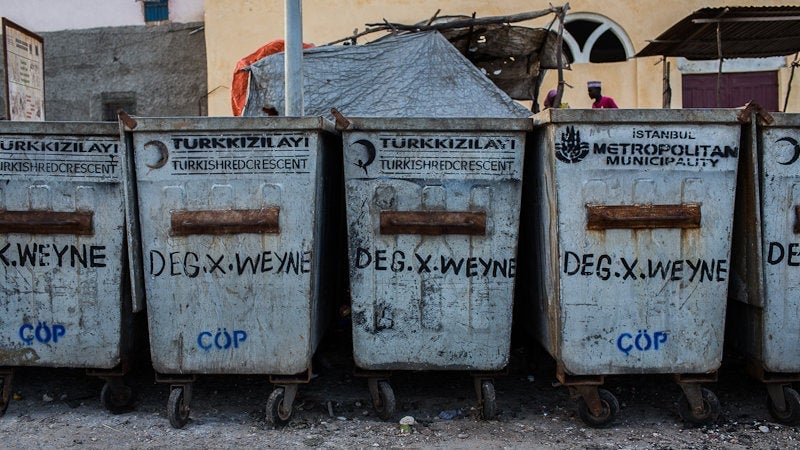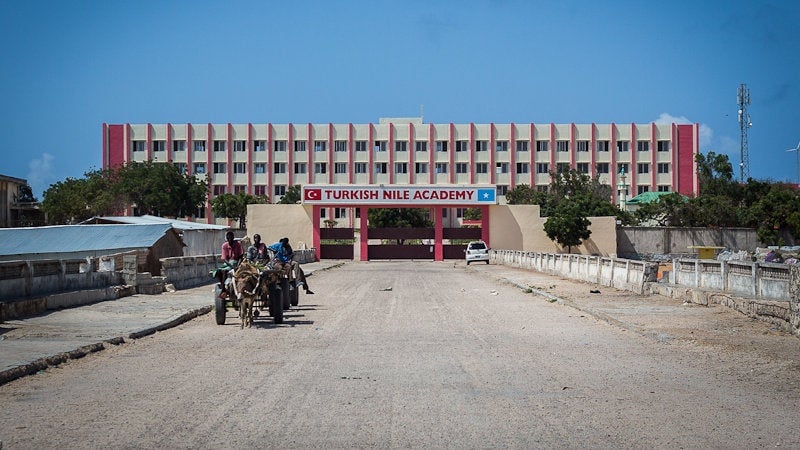Turkey is poised to cash in on a stable Somalia
Two flags now fly over Mogadishu. There’s the Somali one, of course: white star, blue background. The other’s rise over the battered concrete sprawl is more recent. It flies over schools and hospitals, is stamped on trucks and painted on trash bins. The white-and-red emblem even shares the desk of the city’s mayor.

Two flags now fly over Mogadishu. There’s the Somali one, of course: white star, blue background. The other’s rise over the battered concrete sprawl is more recent. It flies over schools and hospitals, is stamped on trucks and painted on trash bins. The white-and-red emblem even shares the desk of the city’s mayor.
“The Turkish are giving the kind of support we have never seen before. They are changing the face of Mogadishu,” says Somali President Hasan Sheikh Mohamud. The two nations’ flags were flapping in the breeze side-by-side above the Mogadishu airstrip on August 19, 2011, when Turkish Prime Minister Tayyip Erdogan touched down for the first visit by a non-African head of state in nearly two decades. At the time, thousands of Somalis were dying each day in the middle of the worst famine in over half a century, yet foreign dignitaries dared not enter.
That year, Erdogan pledged $49 million to Somalia. In 2012, Turkey spent $70 million on full scholarships to over 1,200 Somali students to study in Turkish universities, making Turkey the largest non-OECD donor in Somalia. And private Turkish citizens donated $365 million on top.
Turkey claims its revamping an outmoded and inefficient aid system, and, in the process, improving more lives.
“Big western donors work through the UN agencies with bureaucracy and high administration costs,” says Kani Torun, Turkish Ambassador to Somalia. “But we use the money to directly support Somalis, and the government of Turkey covers all the administration fees.”
The Somali government says the difference is evident: just look at the results, says President Mohamud. “They are creating modern hospitals and establishing the education system. This cannot be delivered through NGOs and through UN agencies. Bilateral aid is what Somalia needs,” he said.

At his office, the Mayor of Mogadishu, Mohamed Nur, continued the argument.
Compare the Turkish approach to the UN approach, he said.
“If I request computers from the UN, they will take months and require a number of assessments. They will spend $50,000 to give me $7,000 of equipment. If I request computers from Turkey, they will show up next week.” At this crucial moment of transition from chaos to tentative stability, this immediate impact is what Somalia needs most, he said.
But not all are enamored with the bold new initiatives of the Turks. Some donors complain a lack of coordination with the rest of foreign aid institutions results at times in duplicating efforts.
“If the UN Agencies want to coordinate, then come to Mogadishu and we can coordinate,” Ambassador Torun responds. “But we can’t spend all of our time going to meetings in Nairobi when our work is here in Mogadishu.”
Most Western agencies continue to base their Somali operations out of Nairobi, Kenya, citing longstanding security concerns. Turkey knows the risks well; in July, six people died when US-designated terrorist group al-Shabab attacked the Turkish embassy. The Turks stayed nonetheless.
Turkey stands to benefit from its more engaged approach here as the Somali government returns the favor. The Somali government recently awarded a Turkish company, Favori LLC, the contract to renovate, maintain and operate the Mogadishu airport for the next 20 years. And although the Somalia government signed its first new oil exploration deal with a British company, the minister of natural resources, Abdirisak Omar Mohamed, noted that he would have awarded it to the Turks “if Turkey was willing to sign a contract, but Turkey never came and asked for a contract.”
The new Turkish ties filter all the way down to Somalia’s famously entrepreneurial family businesses. Local contractor Abdunir Abukar works with a Turkish company rehabilitating properties across Mogadishu. His workers initially resisted working with the Turks, he said, due to communication barriers and a Somali work ethic that atrophied over two decades of conflict. “Our employees have adapted. They have learned discipline and technical skills from them.”
These small changes can multiply quickly. A more disciplined and skilled workforce encourages the diaspora to return and help rebuild, which in turn creates more stability, creating a self-reinforcing cycle of development.
Abdul Majeed Iman owned several shops prior to the civil war. His buildings and inventory were completely destroyed. He returned to Mogadishu in 2010 and re-opened a retail shop. Now, he sources some of his merchandise from Turkey.
“Turkish companies have requested to work together. They have offered to fly businessmen over to Turkey to discuss how they could cooperate,” he said. Despite his own entrepreneurial background, he adds: “We can learn from the Turkish expertise.”
Turkey sees the tightening business ties as more beneficial than the aid it provides. “We encourage business activity because it’s good for Somalis, it creates jobs, teaches Somalis skills and creates less aid dependency,” said Ambassador Torun. Of course, Turkey is looking to profit as well.
Turkish business moving in to Somalia are in direct competition with other international companies operating in Somalia, at times resulting in a zero-sum game for key contracts. For instance, SKA, a company from Dubai, had a 10-year contract to operate the airport. But the Somali government abruptly cancelled the contract and gave it instead to a Turkish company, leaving some to question whether Turkey’s aid has created an unfair competitive advantage with the Somali government.
By accepting the risks here when nobody else was willing to, Turkey more than any other country, is poised to cash in on the rise of a stable Somalia. It’s a unique soft power strategy: more direct than Western nations, more cooperative and willing to transfer skills than China.
Since 2005, Turkey has significantly increased its presence in Africa, going from 12 embassies in 2005 to 34 today. Its aggressive expansion demonstrates a desire to fight for influence on the continent that is poised to be the fastest growing over the next few decades, adding 1.3 billion people by 2050. The general narrative is that China is the most important partner to Africa, but if Somalia is any indication, Turkey might be a real contender.